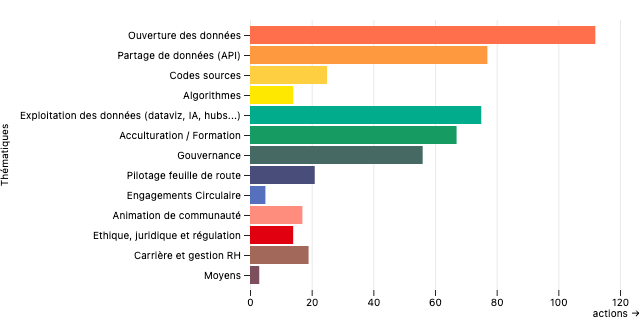While the word “data” is sometimes frightening, evoking for some the idea of unauthorized access to our personal data for fraudulent purposes, open data seems to represent a real opportunity in a range of fields linked to education. Researchers, teachers and, of course, students all need access to data to enrich their research, document teaching content or validate their projects and studies. But what do we mean by open data?
The Open Data movement, which originated in the United States and Great Britain, aims to open up and make accessible the data produced and collected by public service organizations. It thus concerns all public administrations, public and private establishments, which must publish any administrative document relating to a public service mission. But they must also comply with regulations, notably those concerning the protection of personal data. Once published, data can be reused by anyone who wishes to do so, provided they comply with the provisions of the CRPA (code des relations entre le public et l’administration) and the RGPD (general regulation on data protection).
What is data?
“Data is the lowest level of abstraction, from which information and then knowledge are extracted”, David Tarrant – Open Data Institute.
Data.gouv.fr is the open platform for French public data. It’s an open, community-based platform where anyone can publish!
It is aimed at :
- data producers who wish to publish their data in open, reusable formats;
- reusers, who can download data and reference their projects;
- but also to all citizens, associations and companies, who can discover and use open data.
Today, there are over 41,000 datasets available, and almost 94,000 users.
Making public data available in Open Data – Summary of ministerial roadmaps – Sept 2021

Before fully exploiting the richness of a collaborative model that promotes exchange and openness, all publics are first and foremost concerned by the issue of security. Indeed, data is of major interest to science, education and the study of the evolution of our societies only if it is sufficiently protected from all those who seek to exploit it fraudulently.
For researchers, and in line with the National Plan for Open Science, sharing and disseminating research data means complying with the E.A.I.R. principles:
- Easy to (re)find
- Accessible
- Interoperable
- Reusable
First and foremost, therefore, we need to adopt best practices in data management, as suggested in this guide from the University of Strasbourg.
The work carried out by various working groups bringing together researchers from national research organizations and universities, most often with the support of the Comité pour la Science Ouverte (Open Science Committee), helps to support researchers in their “Open data” approach. These initiatives are designed to motivate, reassure and, above all, help researchers define what they can and must do in terms of data openness. But they should always remember the principle “as open as possible, as closed as necessary” !
So why open up research data?
Making research data accessible offers researchers several advantages:
1/ It gives greater visibility to one’s work. And it’s certain that any researcher who reads us knows how frustrating it can be to wait several years for an article to appear in a scientific journal.
2/ This increases the transparency of the methodology and enables the replication of research work. Here again, every researcher knows how important it is for scientific credibility to ensure the reproducibility of research results.
3/ It also encourages the development of research collaborations with other researchers in sometimes related fields.
However, once you’ve been convinced of the importance of making your research data accessible, you still need to know how to go about it.
The University of Paris-Saclay offers a documented approach mobilizing three types of expertise: administrative, technical and legal.
What about teachers and their students? How do they approach Open Data?
Throughout France and the rest of the world, many teachers rely on open data to fuel their courses. The use of regularly updated, “open” data makes it possible to analyze many sociological, economic and even political phenomena. It’s no longer just scientific data linked to the results of laboratory experiments and observations, but much more broadly demographic, social, economic and behavioral data…
To optimize the use of these data, teachers need to be informed and trained in both legal and technical terms. Thus, a theoretical framework around definitions, the main platforms and players will clearly determine what is at stake, while training in technical skills will ensure that teachers handle data in compliance with best practices.
On the student side, beyond learning the theoretical framework of open data, students need to develop data-related technical skills. Finding relevant public data for a project, cleaning and processing this data, creating graphic representations (graphs, interactive maps, etc.) are all skills that need to be acquired during their studies.
The use of these open resources fosters cross-disciplinary skills, a spirit of analysis, critical thinking and a sense of research in young people. Some complex data analysis projects also help to create knowledge on the subjects studied by students during their apprenticeship.
For example, complete data sets on the various editions of the Science Festival can be found on the higher education open data site. Access to each of the more than 5,000 events, with their precise themes, locations and players involved, giving detailed visibility of the program and speakers. All the information you need to promote French science and scientific advances to the general public, nationally and internationally!

The benefits of open data for all
Open data is not a subject reserved for scientists or government agencies. It concerns society as a whole, and should bring citizens closer together, whatever their profession, level of education, social background or place of residence. In this respect, the development of participatory science is an excellent example of how to break down the barriers between science and society.
There are already 173 participatory observatories for species and nature, bringing together more than 75,000 biodiversity observers who share their observation data with scientists.
In the field of education, UNESCO’s International Institute for Educational Planning promotes the use of open school data to build relationships of trust between all stakeholders in school communities.
Access to data enables us to better understand how schools operate and their impact on the educational level of young people, not just in France, of course, but worldwide. According to IIEP-UNESCO, which is conducting a research program to examine school practices around the world, this should ultimately guarantee access to quality education for all.
So for the NGO Link Education, in Malawi, which decided to use open school data to promote collaborative approaches to planning: “Previously decisions about school management were made by a handful of school staff without really involving parents or the community, even though everyone in Malawi knew that this kind of arrangement was ripe for corruption.”
In France, the Ministry of Education is committed to making 28 data sets accessible via the data.education.gouv portal. The platform is regularly updated and enhanced to ensure the four key principles of transparency, quality (of the data), performance (ease of use and visualization options) and user support. As a result, citizens and educational audiences are perfectly able to find out how our education system works.
The use of open data is undoubtedly a real opportunity for progress in education and research. It is at once a source of tremendous innovation for pedagogy, a guarantee of transparency, and the path to greater access to knowledge for as many people as possible. All those involved in education need to get to grips with the subject, and train themselves in the ethical and responsible use of data, if they are to successfully pursue their universal mission.
To find out more, (re)discover the interview with Matt Sonnati, CEO of Inokufu, a learning objects database!






